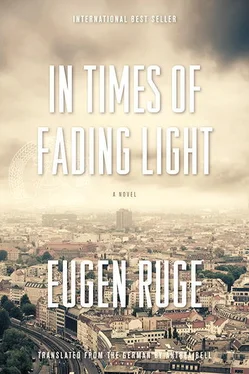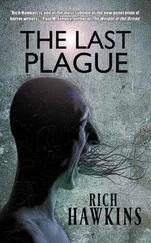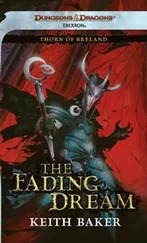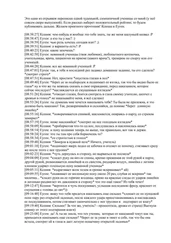Whereas Wilhelm seemed to be feeling better every day. Not so long ago, on the Mexican side of the ocean, he had suffered from chronic insomnia and complained of lack of appetite. But the less Charlotte ate, the more of an appetite Wilhelm seemed to have. He slept well, took long walks on deck every day, even in the worst weather, and when he came back with his tartan cap drenched, but obviously indestructible, he complained that Charlotte spent all her time moping in the cabin.
“I’m seasick,” said Charlotte.
“You weren’t seasick on the way out,” replied Wilhelm.
He, who for twelve years had stood around at any evening party like a forgotten walking stick, who to the last couldn’t read a street sign in Spanish, and had to enlist Charlotte’s help if a police officer spoke to him, suddenly figured as an enthusiastic expert on Mexico, and entertained the company at the captain’s table with accounts of truly amazing experiences, and although he had talked in riddles and hints ever since his Hamburg days— Lüddecke Import and Export —all and sundry were soon convinced that he had crossed the country between the two oceans on horseback, had fished for shark from a canoe in Puerto Ángel, and had personally discovered the Maya temple of Palenque among the jungle plants rambling over it—while Charlotte dunked rusks in chamomile tea.
The icy wind with which the new Germany received them didn’t seem to affect Wilhelm in the least. Holding himself very upright, he stalked through the harbor area, holding on to his hat, with as much certainty as if he knew his way around. Charlotte tripped along after him, her shoulders hunched.
Then they were in a hut, a pale man was looking at their papers, and while Charlotte was wondering how she should address a comrade of the Customs service in the new Germany—as Bürger or Genosse? —Wilhelm had settled everything and even ordered a taxi.
What they saw of the city wasn’t basically very different from the harbor, and although at first glance Charlotte couldn’t see any recent evidence of ruins, just about everything looked ruined: the buildings, the sky, the people hiding their faces behind turned-up collars.
Soup was being sold from a large container on a street corner.
Two figures were trying to haul a handcart brimming over with old junk up onto the sidewalk.
It began to dawn on Charlotte that the hat with the little black veil that she had bought especially for arriving back in Germany had not been a good idea.
Wilhelm ordered the porter around. Charlotte gave the startled man a two-dollar tip.
“You’re overdoing it,” said Wilhelm.
“So are you,” said Charlotte.
The train came in, hissing alarmingly. It smelled of railroads: the typical mixture of soot and excrement. Charlotte hadn’t traveled by rail for a long time.
She looked through the window. The landscape passed by to the regular thud-thud of the turning wheels. The forest was dripping wet. Dirty remnants of the first snow lay on the fallow fields. Smoke rose from the grade-crossing keeper’s little house, and even as they went by Charlotte caught sight of the keeper beginning to wind the barriers up again.
“A crossing keeper,” said Wilhelm. Triumphantly, as if that proved something.
Charlotte didn’t react, but went on looking at the scenery. Tried to spot something comforting; tried to be glad of the brick-red church tower; tried to feel some kind of sense of homecoming at the sight of the landscape. The tree-lined highways, at least, reminded her that even Germany had something like summer. A mild wind as you rode along, Wilhelm’s BMW R32 motorbike and sidecar with the boys sitting in it. Unsuspecting. Laughing.
The train stopped, the compartment door opened. A breath of brown-coal soot and cold rain blew in. The man who followed it didn’t say a word of greeting, didn’t take his coat off as he sat down; it was a worn old dark leather coat. He had mud on his shoes.
The man inspected them briefly out of the corner of his eye, then took a sandwich box from his briefcase and removed a sandwich with a few bites already taken out of it. He munched assiduously for a long time, and then put the sandwich, three-quarters consumed, back in the box. Then he took a copy of Neues Deutschland out of his briefcase and opened it, and Charlotte immediately noticed a headline on the back page of the newspaper, which was turned toward her.
THE PARTY NEEDS YOU!
Charlotte felt ashamed. Ashamed of the little veil on her hat. Of her fears. Of the fifty cans of Nescafé in her cabin trunk… yes, the Party needed her. This country needed her. She would work. She would help to build up the country—could there be a finer task?
Now the man was holding the ND so that she could also see the lower part of the page. Minor items, small ads, but suddenly they interested her. How good to know that, if she wanted, she could actually go to the Stern cinema in the Berlin Mitte district this evening—it was showing The Way to Hope, Charlotte was prepared to take that title as a good omen, and it moved her almost to tears—why?—when under the heading of Highlights she read:
Orders for large Christmas trees to be sent in writing or by telephone to the Greater Berlin Co-Operative by 18 December at the latest.
The man opened his newspaper right out, so that Charlotte could see the front page, and as if of its own accord her glance fell on a picture caption saying:
State Secretary in the Education Ministry, Comrade…
And the next words ought to have been: Karl-Heinz Dretzky.
But they weren’t.
The train was jolting over points. Charlotte staggered back and forth in the corridor, hardly aware of what she fell against. With difficulty, she reached the toilet, flung up the lid with her bare hands, and vomited what little breakfast she had eaten.
She closed the lid again, sat on it. The thud-thud of the train wheels was going straight into her teeth now, straight into her head. She still felt the cold, probing look that had been turned on her over the top of the news paper. Black leather coat—of all garments. It was all clear, it made sense.
Infiltrated, that was the word. The Party was supposed to have been infiltrated by the Zionist agent Dretzky.
There was a squealing and a creaking as if the train were about to fall apart. She held her head in both hands… or was she losing her mind? No, she was in command of her reason. Her head was clearer than it had been for a long time… If only the paper had said, the new state secretary… She almost chuckled with pleasure to realize how well she had learned to distinguish these fine nuances. The new state secretary; that would imply that there was an old one around somewhere… but there wasn’t any old one. He didn’t exist. They were the protégés of a man who didn’t exist. They were as good as nonexistent themselves. There’d be men in black leather coats standing at the Berlin East rail station, and Charlotte would follow them without resistance, making no fuss. Would sign confessions. Would disappear. Where to? She didn’t know. Where were the people whose names were never mentioned anymore? Who not only didn’t exist, but who had never existed?
She stood up, removed her hat. Rinsed out her mouth. Looked at herself in the mirror. Idiot.
Took the nail scissors out of her purse, cut the little veil off her hat. She would at least spare herself that.
The man was standing in the corridor, smoking. She squeezed past without touching him.
“Where’ve you been all this time?” asked Wilhelm.
Charlotte didn’t reply. She sat down, looked out the window. Saw the fields, the hills, saw them yet didn’t see them. Was surprised by her present thoughts. She thought she ought to be thinking of something important. But she thought of her Swiss typewriter without the “ß” character. She thought of whoever would reap the benefit of those fifty cans of Nescafé. She thought of the Queen of the Night that she had had to sell back to the flower shop (at rock-bottom price, too). And she thought, while outside the train a film without any plot was showing, while a tractor was crawling across a field…
Читать дальше












